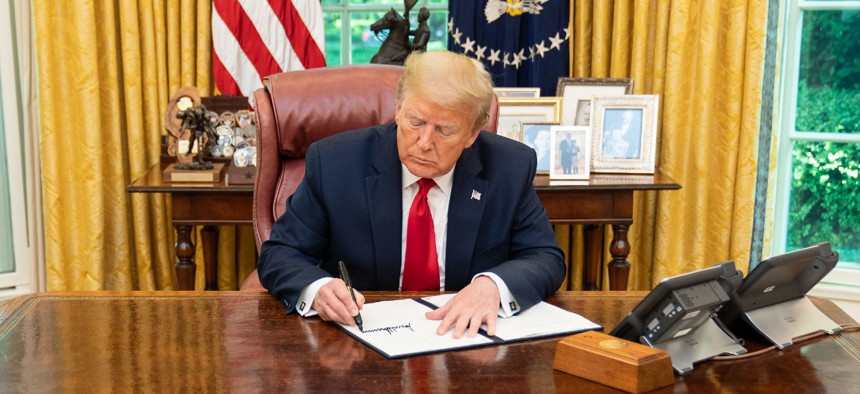
Presidents have used executive authority to advance policy agendas in the absence of Congressional support. Above, President Trump signs an executive order in June directing federal agencies to bypass environmental restrictions in the permitting process. Official White House Photo by Shealah Craighead
The Administrative Presidency Meets Federalism: Hostile Takeovers in the Trump Era
With the Justice Department dominated by the White House, state attorneys general have taken on the role of defending federal law and executive branch discretion.
With the presidential election just days away, President Donald Trump has continued to demonstrate his determination to advance his policy agenda through a “hostile takeover” of key policy areas. In a new Brookings Institution Press book, Trump, the Administrative Presidency, and Federalism, we define hostile takeovers as involving high-priority, politically-salient presidential efforts to reorient a major policy through executive initiatives where its goals depart sharply from those of key agencies and actions taken by the prior presidential administration to realize them. These tend to be signature actions of a president upon taking office. As such, the causal dynamics shaping the implementation fortunes of a hostile takeover are likely to differ appreciably from those of less prioritized and visible presidential actions involving more incremental policy adjustments.
During the first three years of his presidency, the Trump White House launched a wide range of unilateral efforts, including aggressive use of appointments, executive orders, regulatory overhauls, waivers of existing laws, implementation delays and other tactics. This has produced an administrative and legal war against the Affordable Care Act, a series of strikes against the previous use of Clean Air Act sections to address climate change, and far-reaching efforts to roll back Obama era rules that enforced student and civil rights in education and protected student borrowers against fraudulent practices of for-profit organizations.
Trump’s hostile takeover has advanced aggressively but remains incomplete so far. Why? We argue that forces of federalism have provided formidable institutional checks when the Republican-dominated House (2017-18) and the Republican-controlled Senate (2017-now) deferred to the Trump White House on key policy issues in health care, climate change, and education. There are strong parallels here to the intensive state response that the Obama administration also faced in advancing its own version of executive-driven policy.
In a system built on federalism, states and localities, aside from the expected partisan polarization, may check or facilitate the power of an administrative presidency. Our analysis points to two major pathways in this regard. The first focuses on the role of top state government policymakers, including governors, state agency heads, and legislators.
The second stresses the increasingly central role of coalitions of state attorneys general from multiple states in rallying the courts to strike down or constrain presidential initiatives. From the perspective of checking an administrative presidency pursuing initiatives that threaten the rule of law, the potentially formidable role of state attorneys general (typically from the opposing political party) deserves emphasis.
Even more dramatically, state attorneys general became substitutes for the White House-dominated Justice Department in defending federal law and executive branch discretion. When the Trump administration refused to defend ACA constitutionality, for example, Democratic state attorneys general stepped in to support federal law.
In the electricity sector, Democratic attorneys general from 22 states and lawyers from the Democratic-led District of Columbia and six major cities announced plans in August 2019 to combat the Trump administration’s efforts to largely eviscerate the Clean Power Plan in court. In the transportation sector, California Attorney General Xavier Becerra led other Democratic attorneys general in early 2020 challenging the Trump administration’s unprecedented decision to retract a Clean Air Act waiver for tailpipe emissions that had already been granted to California and built on a half-century of precedents grounded in statute.
State attorneys general also played a significant albeit less dramatic role in the education arena.
In an amicus brief filed in the Eleventh Circuit Court of Appeals, 20 Democratic state attorneys general supported the rights of a Florida transgender student to use the boys’ bathroom at school. Likewise, when the Trump administration stopped processing cancellation claims primarily from students who had attended for-profit institutions of post-secondary education in early 2017, 18 Democratic state attorneys general along with the District of Columbia sued the Education Department. The federal district court sided with the states, finding the actions of the department to be “arbitrary and capricious” under the Administrative Procedure Act.
State attorneys general have since the mid-1990s loomed especially large in challenging executive branch actions and congressional legislation. Two trends in federal jurisprudence have enhanced the leverage of state attorneys general. First, the federal judiciary has granted states “special solicitude” in determining whether they have standing to bring suits, making it easier for state attorneys general to access the courts and advance high-profile challenges to federal executive decisions. Second, state attorneys general have gained leverage from the increased willingness of federal district court judges to issue sweeping injunctions that block executive actions nationwide rather than in more limited domains.
These developments further increase the number of potential veto points for presidential initiatives in the American federal system, particularly significant in an era where Congress has proven decreasingly able to sustain many of its traditional roles. Regardless of who wins the presidency in November, the forces of federalism and the courts will remain important checks on presidential power in our democracy.
Frank Thompson, Kenneth Wong, and Barry Rabe are coauthors of Trump, the Administrative Presidency, and Federalism, published by the Brookings Institution Press 2020.






